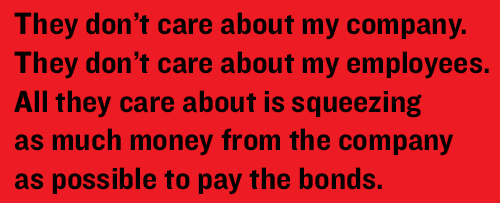Boaz Gilad was a pioneer among U.S. real estate developers raising cheap capital in Israel.
Over the last five years, a holding company tied to Gilad’s Brookland Capital issued about $54.5 million in bonds on the Tel Aviv Stock Exchange, using the proceeds toward its ever-expanding Brooklyn multifamily portfolio. But on Jan. 2, amid concerns in Israel over the company’s ability to pay back its debts, bondholders gave Gilad three hours to relinquish control of Brookland Upreal — the British Virgin Islands-incorporated entity that issues bonds in Israel — to a special administrator.
And now that bondholders are appointing someone else to oversee the BVI holding company, the implications on Brookland’s U.S. portfolio of more than 30 properties and 2,000 housing units remain unclear.
“They don’t care about my company. They don’t care about my employees,” Gilad said. “All they care about is squeezing as much money from the company as possible to pay the bonds.”
Gilad, who owes about $42 million to bondholders over the next three years, acknowledged that it had been a rough year. Brookland, known for being the most prolific developer in Brooklyn, has been struggling with rising construction costs and internal restructuring, including Gilad buying out his partner Assaf Fitoussi in 2017.
After the release of a report that cast doubt on Brookland’s repayment abilities, the company’s bonds lost 15 percent of their value over two days in July. In November, the firm announced it would not meet its upcoming debt obligations because of a series of delays and increased costs slowing down the rate of development on several of their projects. Trading on Brookland’s bonds has been stalled since.
Gilad hopes to settle with his Israeli bondholders at some point but plans to focus on Brookland Capital — his Brooklyn-based firm — for now. The firm is looking to refinance its debt and is considering selling some of its properties — mostly development sites — to get through the rough patch. It is working with brokerage TerraCRG on the potential sales.
Sites on the market include 99 Grove Street and 1222 Putnam Avenue in Bushwick; 227 Clarkson Avenue in Prospect-Lefferts Gardens; 658 and 807 Washington Avenue in Prospect Heights; and 1312 Lincoln Place in Crown Heights.
Gilad stressed that this was a last resort for him, and he would much rather keep the properties.
“I am considering selling some of my assets, but I’m a developer,” he said. “My intention is to finish and develop it.”
However, the authority the new administrator has over what Brookland Capital does with its projects is still unclear. (New Jersey landlord Ronel Ben-Dov has been appointed but still needs to be confirmed.)
“While yet untested and, for now, unchallenged, it appears that the bond holders have installed an officer who is entitled to administer and control the entire portfolio,” said Douglas Heitner, an attorney at Kasowitz Benson Torres LLP who has worked on Israeli bond deals for American developers. “This would presumably include selling and refinancing assets so as to return dollars to the bondholders.”

Gilad disputed this, saying that the level of authority the new administrator has over Brookland Capital is one of the main points of contention between him and his bondholders.
An analysis from The Real Deal found that Brookland has roughly $150 million in debt across 23 loans, most of which are for less than $10 million. Many of the loans were from private lending shops, which tend to charge higher interest rates — but the rates and terms were not publicly available.
The largest loan is for $20 million on 140 15th Street from Spruce Capital Partners. Gilad claimed that because these are primarily construction loans and funds are dispersed over time, there’s currently only $80 million of outstanding debt. The senior lenders must be repaid before the bondholders receive what’s left over.
Brookland’s tumble on the TASE appears to be a first for American real estate companies issuing bonds in Israel. (The only real estate company to go belly up on the stock exchange recently was Canadian condo development Urbancorp in 2016 — but sources have previously described that situation as an outlier and “borderline fraud.”)
One source explained that it was likely that Brookland could have refinanced its bonds before having to pay back the principal, of which an $11 million payment is currently due in December. Up until this point, the developer only had to meet interest-only payments. But because of a broader anxiety in the Israeli market regarding American real estate companies, the market may not have been receptive to a refinancing.
“While Brookland may be unique in certain respects, they’re not in the most important respect which is all that happened was the calendar crept up on them,” the source said. “And they were planning like everybody else to go back to the Israeli market to refinance that payment obligation, and they found the market uncooperative.”
Across the board, many American bonds have taken a beating in Israel following a series of troubling disclosures. In December, Yoel Goldman’s All Year Management said there was a “material error” in its financial statements from the second and third quarters linked to $3.7 million that was mistakenly moved to Goldman’s personal account from the company’s account. And in early January, GFI Capital Resources, led by Allen Gross, and All Year both had to correct financial statements. GFI made hundreds of changes to its 2017 year-end report, including lowering its net operating income from 2015 to $8 million from $28 million. One real estate source described Brookland, GFI and All Year as “the poster boys for doom and gloom.”
